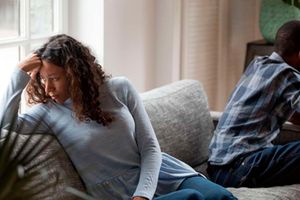Effective sleep-boosting tips for people who are sleep deprived

On average, adults need 8 hours of sleep per night to function well during the day.
What you need to know:
- Sleep deprivation refers to lack of sleep, or not having enough hours in a 24-hour period to entirely refresh oneself for natural bodily purposes such as healing, growth, and regeneration.
- Lack of sleep can lead to increased feelings of sadness and hopelessness, which can trigger thoughts of suicide.
Studies show that people who regularly sleep for less than six hours a night are more likely to be depressed, and have higher rates of suicide or self-harm. The reason for this correlation is that when the body does not get enough rest, it releases hormones called cortisol which increase stress levels in the brain.
When you don't get enough sleep, you produce less serotonin, and this increases anxiety. If you know someone with depression encourage them to get plenty of rest.
The lack of sleep
Sleep deprivation refers to lack of sleep, or not having enough hours in a 24-hour period to entirely refresh oneself for natural bodily purposes such as healing, growth, and regeneration.
Effects of not getting enough sleep include irritability, anxiety, problems concentrating or remembering things, weight gain, and an increased risk of diabetes.
Lack of sleep can also lead to increased feelings of sadness and hopelessness, which can trigger thoughts of suicide.
A sleep-deprived person is likely to have these symptoms:
- Slowed mental process and memory loss
- Short, disrupted attention span
- Inability to make well-informed decisions
- Fatigue
- Mood swings such as stress, anxiety, or irritation
The common causes of sleep deprivation
The first and probably most common cause of sleep deprivation is not sleeping enough. On average, adults need 8 hours of sleep per night to function well during the day. Less sleep can lead to drowsiness and trouble concentrating as well as irritability and mood swings.
The second major cause of sleep deprivation is "sleep debt" which develops over time when an individual consistently sleeps less than their body needs. Some factors which can increase a person's risk for developing a sleep debt include a stressful lifestyle, a new baby in the home, or changing one's work hours. An example is when one returns to work after maternity leave. They may have been used to sleeping longer hours but suddenly have to go to work during the day and take care of the baby at night. It is easy for such a person to develop a sleep debt.
People who suffer from depression tend to have a higher rate of sleep deprivation. This is because they often lack motivation and energy, making it difficult for them to get up in the morning, let alone go to bed at a reasonable time each night. In addition, many people with depression have insomnia or other sleeping disorders such as restless leg syndrome, which makes it difficult to fall asleep.
People with depression are also more likely to engage in unhealthy behaviors such as smoking, drinking alcohol excessively, and taking over-the-counter medications and prescription medication which can disrupt sleep patterns. In addition, when individuals who are depressed don't get enough sleep, it frequently leads to other depressive feelings as their bodies do not have the energy or motivation to want to accomplish anything.
Improving sleep
- Create a consistent schedule by waking up and going to bed at the same time every day (including weekends). This helps to set your daily rhythm.
- Decrease daytime naps because they can interfere with nighttime sleep. For example, take a 15-minute power nap instead of a 2-hour nap in the afternoon.
- Maintain a proper sleeping environment. For example, if you can't get your room dark enough, get an eye mask so your body will release melatonin during sleep.
- Avoid caffeine 6 hours before bedtime or alcohol 4 hours before bedtime.
- Avoid heavy meals and exercise before going to sleep.
- Limit your time on the computer or tablet right before you go to sleep because the light from these screens can stop melatonin production, which helps you fall asleep.
- Just before going to sleep, try doing some relaxation techniques such as deep breathing.
Combating depression
Here is what you can do to help yourself if you feel depressed:
- Exercise has been proven to work as a natural anti-depressant. Doing yoga or stretching can make you feel better and help your body cope with stress.
- Eat healthily, avoid processed foods, sweets, refined sugar, alcohol, smoking, drugs, etc.
- Meditating for 10 minutes before bedtime can help shift your nervous system into a relaxed mode.
- Research shows that spending time around trees helps combat feelings of depression.
The bridge between despair and hope is a good night sleep
It is easy for many people with depression to become discouraged and lose motivation when they cannot get a good night's rest. This can make it even difficult for them to function well during the day, triggering additional feelings of sadness and despair.
When people become depressed, it is important that they seek help from a specialist to combat the symptoms and get their lives back on track again.




